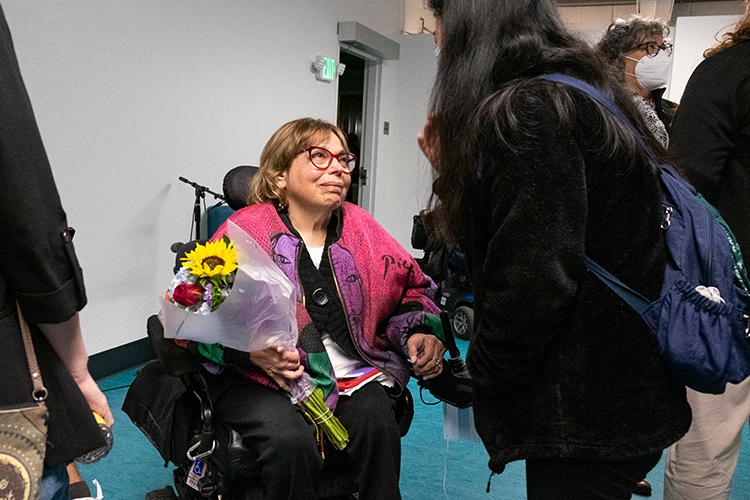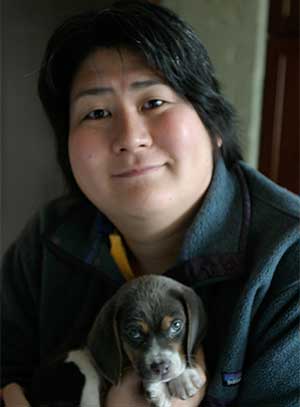
UC Berkeley staff, faculty and alumni are remembering the life of Judith “Judy” Heumann, considered “the mother” of the disability rights movement. (UC Berkeley photo by Sofia Liascheva)
The imprints of Judith Heumann’s life’s work can be found by walking through UC Berkeley’s campus, from the braille signage on restroom walls to the curb cuts and ramp accessible structures. Campus resources like the Disabled Students’ Program and the newly opened Disability Cultural Community Center demonstrate the systemic changes Heumann inspired nearly 40 years after she graduated.
Beyond Berkeley, Heumann’s impact also can be seen around the world in every building, classroom and institution that initially rejected people because of their disabilities. Heumann courageously fought for, and eventually won, access for them.
That unyielding moral compass to fight for a once segregated disabled community is what propelled Heumann to be called “the mother” of the disability rights movement. In the 1960s and ‘70s, her mission spearheaded the passage of disability rights legislation including Section 504, the Individuals with Disabilities Education Act, as well as the Americans with Disabilities Act (ADA) and the Rehabilitation Act.
To this day, these laws continue to make the lives of disabled people better.
Heumann gave a talk at UC Berkeley on the long fight for inclusion in October 2022, featured on the
Berkeley Talks
podcast.
Listen to the lecture and read the transcript on
Berkeley News.
Heumann passed away in Washington, D.C., this past weekend at age 75, leaving members of the Berkeley campus community reeling from her loss.
“As we mark her passing, I know Judith’s zealous leadership and love of community are here with us,” said Dania Matos, Berkeley’s vice chancellor for equity and inclusion. “She will undoubtedly continue to inspire disability rights and collective liberation work, both here on campus and beyond, for decades to come.”
For those at Berkeley who knew her, Heumann’s legacy can be found in the lives she touched and inspired.
‘A fearless force of nature’
Fellow Berkeley alumna and disability rights advocate Ella Callow said Heumann was “the heart” of the disability movement and had an ability to unite people across various generations.

Ella Callow, director of the Office of Disability Access and Compliance at UC Berkeley. (Photo courtesy of Ella Callow)
As Berkeley’s Disability Access and Compliance Office director, Callow said she first met Heumann 10 years ago while working with the National Center for Parents with Disabilities and their Families, a group that includes several of the original leaders of the disability rights movement. In that advocacy, Callow said she saw firsthand Heumann’s pragmatic approach to bringing accomplishments for disabled people.
“She was such a fearless force of nature,” said Callow. “There was no political posturing from her. She came from a place of searing love. And it was real and genuine and contagious. … With her passing, there is such deep sorrow that you feel that a great force has left the world. But her life is something we should rejoice in and remember.”
Born in 1947 in Philadelphia, but raised in Brooklyn, New York, Heumann contracted polio at the age of 2. She would never be able to walk, and because schools labeled her a fire hazard, Heumann and her parents had to fight to get her access to a classroom. After graduating from Long Island University in 1969, she became the first teacher in the state of New York to use a wheelchair after suing the board of education, which initially feared she could not help evacuate students in an emergency.
As a student at Berkeley, Heumann earned a master’s degree in public health, but her fight for civil rights continued as she helped lead a protest that shut down traffic in Manhattan against then-President Richard Nixon’s veto of the 1972 Rehabilitation Act. Though she gained national attention for that advocacy, Heumann’s ties to Berkeley and the Bay Area stayed strong.
In 1975, she became the deputy director of Berkeley’s Center for Independent Living, a group she founded to empower disabled people with the resources to live on their own. And in 1977, Heumann helped organize the legendary 28-day 504 Sit-In in front of San Francisco’s federal building to protest lack of follow through for federal civil rights legislation for disabled people.
“Some people say that what I did changed the world,” Heumann wrote in her 2020 memoir, Being Heumann. “But really, I simply refused to accept what I was told about who I could be. And I was willing to make a fuss about it.”
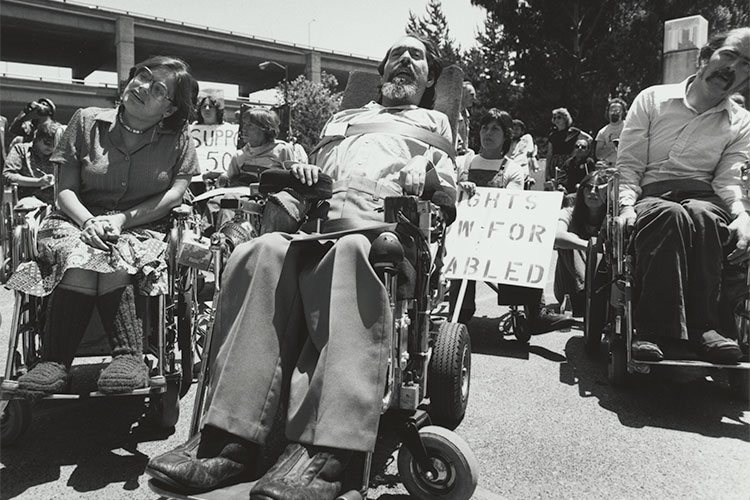
Judy Heumann and Ed Roberts join a 28-day San Francisco protest over housing discrimination in 1977. (Betty Medsger Disability Rights Photographs/The Bancroft Library, UC Berkeley)
In 1993, Heumann moved to Washington, D.C. She served as U.S. assistant secretary of education for special education and rehabilitative services under President Bill Clinton and later as special adviser on international disability rights for President Barack Obama. She also was appointed as Washington, D.C.’s first director of the Department on Disability Services.
In these roles, Heumann would guide national discourse and policy for people with disabilities across the country.
“She helped to craft five different pieces of human and civil rights legislation and civil rights that are far-reaching,” said Callow, who credits Heumann for the existence of her current role at Berkeley. “I don’t know many civil rights heroes who have had such success.”
A global icon
Karen Nakamura, a Berkeley professor of cultural anthropology, worked with Heumann briefly when Nakamura was Japan’s representative to the United Nations Convention on the Rights of Persons with Disabilities, a human rights treaty to protect the rights and dignity of persons with disabilities. Heumann served as the U.S. delegate, Nakamura said, and the two met for the first time five years ago at Heumann’s Washington, D.C., home.
“It was like meeting the pope,” said Nakamura, who currently leads the Berkeley Disability Lab on campus. She added that, in Japan, Heumann’s legacy is just as strong, because the framework that exists for persons with disabilities there was inspired by Heumann’s work with Berkeley’s Center for Independent Living.
“She helped pass legislation that gave students with disabilities the ability to attend [Berkeley],” said Nakamura. “Even more than that, she influenced the creation of independent living centers, as well as similar laws, policies, and programs around the world. That global impact is really exceptional.”
“And so many of our foreign students at Berkeley are able to be students because of Judy’s work.”
Almost all of the nearly 5,000 students that Berkeley’s Disabled Students’ Program has served this year owe their access to higher education to Heumann, Nakamura said.
“She had this amazing combination of warmth and a charisma that could really pull you in. … But she was also not afraid to hold your feet to the fire if she needed to,” said Nakamura. “Judy embodied every principle of the movement. She was our spiritual compass, and she will be deeply missed.”
A supportive, ‘unapologetic light’
More than her legislative work, Heumann was a mentor to many prominent disability advocates, including Berkeley alumni like Victor Pineda, who currently directs Berkeley’s Inclusive Cities Lab and is a lecturer in the College of Environmental Design.
“As we mourn the passing of Judith Heumann, let us also honor her by continuing the work to which she dedicated her life. Now is the time to build on her legacy,” Pineda said. “We are the bearers of her torch. We must uplift the voices of persons with disabilities with intersectional identities, advance partnerships with all underrepresented communities and foster a world where everyone has the opportunity to thrive.”

Wai-Yee Kwong testifying at a senate hearing for student disability rights in 2014. (Photo courtesy of Ann Wai-Yee Kwong)
Ann Wai-Yee Kwong was a Berkeley undergraduate when she first met Heumann at a 2015 campus panel discussion. Wai-Yee Kwong said she had just written a research paper about Heumann’s work in the disability rights movement.
The two kept in touch, and when Wai-Yee Kwong moved to Washington, D.C., a few years later to pursue postgraduate internships, they would often grab a cup of coffee or meet at Heumann’s home to talk about Wai-Yee Kwong’s aspirations and dreams.
“If I needed anything, she would literally pick up the phone to call people she could introduce me to,” she said. “Her tenacity to contribute to the work of disability inclusion was unmatched.”
In hearing about Heumann’s passing, Wai-Yee Kwong said she felt “deep shock and sadness.”
As director of Berkeley’s Disability Cultural Community Center, Wai-Yee Kwong said she remembered just last fall when Heumann visited campus to celebrate the center’s grand opening. It was the last time she saw her.
“She was so excited that I had just gotten married and wanted to watch the video of our wedding over and over,” said Wai-Yee Kwong. “She was just such a genuine and generous person and was authentically interested in the lives of the next generation of folks with disabilities. … She supported our passions, and I’ll miss her voice and guidance in my life.”

Heumann (center) during a panel discussion last October at Berkeley’s Disability Cultural Community Center. (UC Berkeley photo by Sofia Liascheva)
Recent Berkeley alumna Alena Morales met Heumann for the first time during the grand opening of Berkeley’s Disability Cultural Community Center that included a panel discussion about Camp Jened, a summer camp for people with disabilities in the Catskills that Heumann attended in the 1960s. That experience was the focus of the Oscar-nominated documentary film, Crip Camp: A Disability Revolution.
Morales, who as a student helped to advocate for the creation of the community center, said she had grown up reading about Heumann in history books and felt “starstruck” when they met. The two kept in touch over the last months of Heumann’s life.
“She was the reason I came to Berkeley,” said Morales, who is currently a registered dietician and exploring the way food access can impact disabilities. “And in talking with her, she was just like, ‘Girl, you’re great.’ She made me feel validated and seen in our community. That was super-motivating to have someone like her to take the time to do that.”
When Heumann passed, Morales said she cried.
“She was such a firecracker in our community. An unapologetic light that really helped me accept my identity,” she said. “She made me feel like my disability was an advantage.”
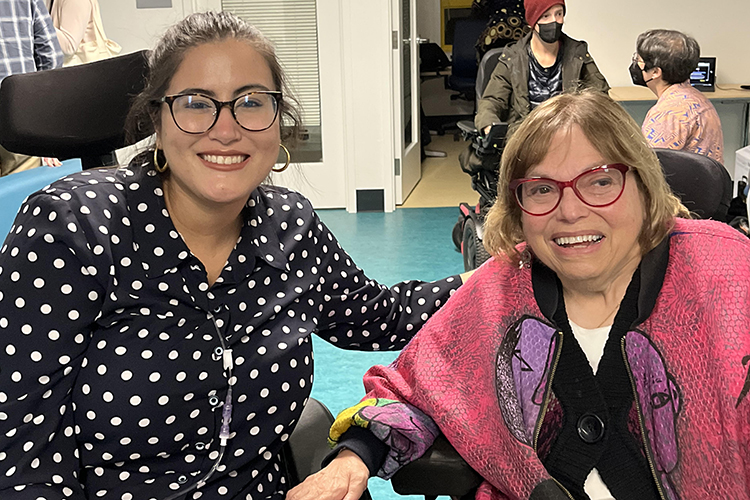
Alena Morales and Heumann met for the first time at Berkeley’s Disability Cultural Community Center on Oct. 24. (Photo courtesy of Alena Morales)
A love letter to remember
For Morales, it is important for the next generation of disability activists to pay homage to Heumann by understanding her life history.
“Her life is a love letter to remember,” she said.
The younger generation needs to know the battles that Heumann fought, Nakamura added, and that “it is incumbent on all of us to take her torch and carry it on.”
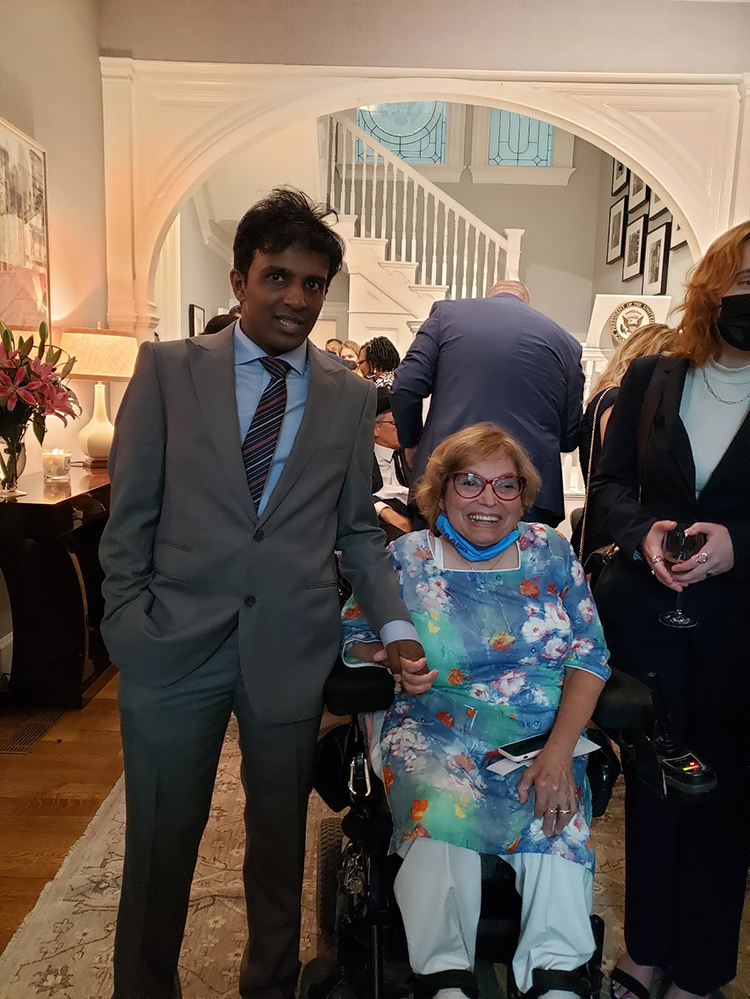
Excerpt from a poem by Hari Srinivasan: “Judy my friend, we mourn your passing/But celebrate your life, your impact everlasting/Your legacy will continue, a beacon of hope/For a future where all can thrive and cope.” (Photo courtesy of Hari Srinivasan)
That also is true for Hari Srinivasan who, as a student, met Heumann when he interviewed her in 2019 for the Daily Californian. Srinivasan, who graduated with a degree in psychology last year, said the warmth and encouragement Heumann gave to everyone she knew is a “huge impetus to strive for more and carry on her work.”
“She called for us to be feisty and disabled. To demand for our rights and to call out discrimination. She herself never took no for an answer,” said Srinivasan. “… I wish I could have known her longer. I join millions around the world in saying, ‘I so, so miss you, friend.'”
While Heumann can no longer be physically present in their community spaces, Callow said she believes students can look to her as a role model and continue to build on her work.
“She has created a playbook that we can all follow,” said Callow. “She was always about fixing things. And that’s what she did. … So, when we talk about historical figures, changemakers that motivated society to be better, she will be considered a seminal figure in history.”

